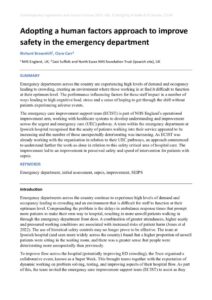| Document | Author Richard Brownhill, Clare Carr |
| Abstract Emergency departments across the country are experiencing high levels of demand and occupancy leading to crowding, creating an environment where those working in at find it difficult to function at their optimum level. The performance influencing factors for these staff impact in a number of ways leading to high cognitive load, stress and a sense of hoping to get through the shift without patients experiencing adverse events. The emergency care improvement support team (ECIST) is part of NHS England’s operational improvement arm, working with healthcare systems to develop understanding and improvement across the urgent and emergency care (UEC) pathway. A team within the emergency department at Ipswich hospital recognised that the acuity of patients walking into their service appeared to be increasing and the number of those unexpectedly deteriorating was increasing. As ECIST was already working with the organisation in relation to their UEC pathways, an approach commenced to understand further the work-as-done in relation to this safety critical area of hospital care. The improvement led to an improvement in perceived safety and speed of intervention for patients with sepsis. |

